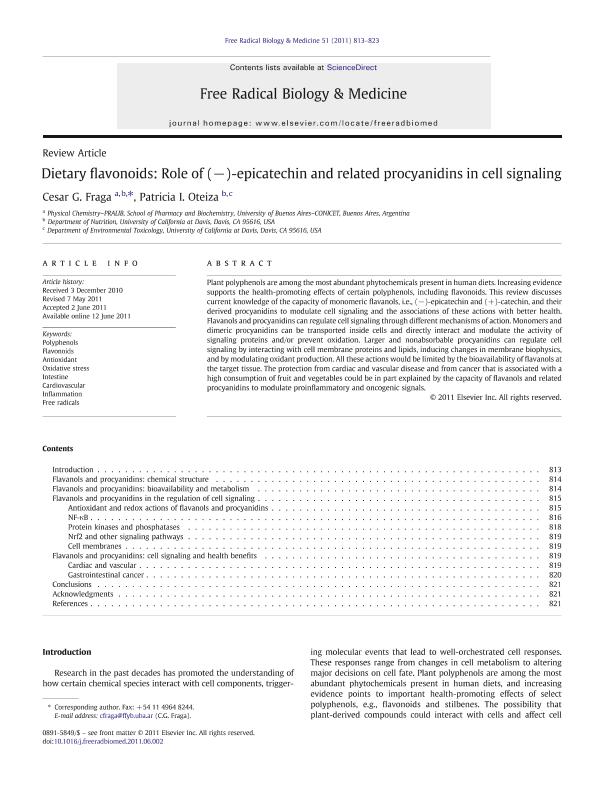Mostrar el registro sencillo del ítem
dc.contributor.author
Fraga, César Guillermo

dc.contributor.author
Oteiza, Patricia Isabel

dc.date.available
2022-02-08T11:53:05Z
dc.date.issued
2011-08
dc.identifier.citation
Fraga, César Guillermo; Oteiza, Patricia Isabel; Dietary flavonoids: Role of (-)-epicatechin and related procyanidins in cell signaling; Elsevier Science Inc.; Free Radical Biology and Medicine; 51; 4; 8-2011; 813-823
dc.identifier.issn
0891-5849
dc.identifier.uri
http://hdl.handle.net/11336/151551
dc.description.abstract
Plant polyphenols are among the most abundant phytochemicals present in human diets. Increasing evidence supports the health-promoting effects of certain polyphenols, including flavonoids. This review discusses current knowledge on the capacity of monomeric flavanols, i.e. (-)-epicatechin and (+)-catechin, and their derived procyanidins, to modulate cell signaling, and the associations of these actions with a better health. Flavanols and procyanidins can regulate cell signaling through different mechanisms of action. Monomers and dimeric procyanidins can be transported inside cells, and directly interact and modulate the activity of signaling proteins and/or prevent oxidation. Larger and non-absorbable procyanidins can regulate cell signaling by interacting with cell membrane proteins and lipids, inducing changes in membrane biophysics, and by modulating oxidant production. All these actions would be limited by the bioavailability of flavanols in at the target tissue. The protection from cardiac and vascular disease and from cancer associated with a high consumption of fruit and vegetables could be in part explained by the capacity of flavanols and related procyanidins to modulate pro-inflammatory and oncogenic signals.
dc.format
application/pdf
dc.language.iso
eng
dc.publisher
Elsevier Science Inc.

dc.rights
info:eu-repo/semantics/openAccess
dc.rights.uri
https://creativecommons.org/licenses/by-nc-sa/2.5/ar/
dc.subject
ANTIOXIDANT
dc.subject
CARDIOVASCULAR
dc.subject
FLAVONOIDS
dc.subject
FREE RADICALS
dc.subject
INFLAMMATION
dc.subject
INTESTINE
dc.subject
OXIDATIVE STRESS
dc.subject
POLYPHENOLS
dc.subject.classification
Bioquímica y Biología Molecular

dc.subject.classification
Ciencias Biológicas

dc.subject.classification
CIENCIAS NATURALES Y EXACTAS

dc.title
Dietary flavonoids: Role of (-)-epicatechin and related procyanidins in cell signaling
dc.type
info:eu-repo/semantics/article
dc.type
info:ar-repo/semantics/artículo
dc.type
info:eu-repo/semantics/publishedVersion
dc.date.updated
2020-04-01T18:04:54Z
dc.journal.volume
51
dc.journal.number
4
dc.journal.pagination
813-823
dc.journal.pais
Estados Unidos

dc.description.fil
Fil: Fraga, César Guillermo. Consejo Nacional de Investigaciones Científicas y Técnicas. Oficina de Coordinación Administrativa Houssay. Instituto de Bioquímica y Medicina Molecular. Universidad de Buenos Aires. Facultad Medicina. Instituto de Bioquímica y Medicina Molecular; Argentina
dc.description.fil
Fil: Oteiza, Patricia Isabel. University of California; Estados Unidos. Consejo Nacional de Investigaciones Científicas y Técnicas; Argentina
dc.journal.title
Free Radical Biology and Medicine

dc.relation.alternativeid
info:eu-repo/semantics/altIdentifier/url/https://www.sciencedirect.com/science/article/abs/pii/S0891584911003601?via%3Dihub
dc.relation.alternativeid
info:eu-repo/semantics/altIdentifier/doi/https://doi.org/10.1016/j.freeradbiomed.2011.06.002
Archivos asociados
